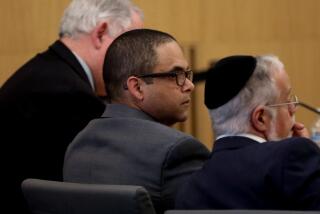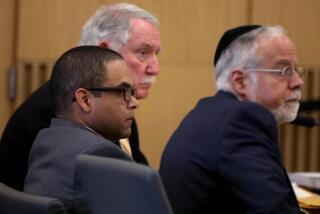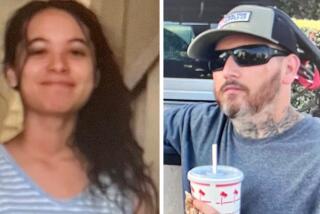Trial in taped shooting begins
Lawyers began the jury screening process Monday in the trial of Ivory J. Webb Jr. -- the former San Bernardino County sheriff’s deputy who shot an unarmed Air Force police officer three times during a traffic stop -- and they got their first taste of how difficult it will be to find jurors who haven’t seen a nationally aired videotape of the incident.
The video, played repeatedly on news programs early last year, was shot by an amateur photographer who rushed outside his house and captured the Jan. 29, 2006, shooting.
Airman Elio Carrion, a passenger in a Chevy Corvette being driven by Luis Escobedo, was shot after the deputy pursued the Corvette at high speed through the streets of Chino.
The chase ended when the Corvette crashed into a wall. On the video, Carrion, who said he immediately got out the car and onto the ground after the crash, appeared to be following Webb’s order to get up when Webb shot him three times. Webb at first accused Carrion of lunging at him. After seeing the tape, he told investigators he thought Carrion was reaching inside his jacket, possibly for a gun.
Escobedo pleaded guilty in November to felony evading a peace officer and driving under the influence with a blood-alcohol content of 0.08% or higher. He was sentenced in January to six months in jail and 36 months’ probation.
On Monday, when Judge Michael A. Smith asked the pool of prospective jurors how many knew about the case, almost everyone in the room raised a hand. Most said they had seen the video.
Webb’s lawyer, Michael D. Schwartz, said he was not surprised. “I would be most concerned if they didn’t raise their hand -- because that would be disingenuous,” Schwartz said. “The test now is to see whether that exposure has tainted them or not.”
“Once somebody forms an opinion, it’s very difficult or nearly impossible to get them to keep an open mind or dissuade them from that opinion,” he said.
R. Lewis Cope, the deputy district attorney prosecuting the case, said he was as concerned as the defense about finding unbiased jurors.
“Both sides want to have a fair trial,” Cope said. “This case is very, very important to the community.”
Webb has pleaded not guilty to attempted voluntary manslaughter and assault with a firearm -- charges enhanced by allegations that he inflicted great bodily injury on Carrion during the incident while using a handgun. Carrion, a U.S. Air Force security officer who had recently returned from duty in Iraq, was hit in the chest, shoulder and leg. He has recovered and has filed a legal claim against the county.
On Monday morning, after the judge excused about 30 of the 80 jurors who said they would lose salary or have other scheduling conflicts over the estimated four weeks of the trial, those remaining were asked to fill out a 170-question survey detailing everything they knew about the case and what their “first reaction” was to hearing about the case.
Other questions included whether they felt the incident was a case of “excessive use of force by a sheriff’s deputy” and whether they could judge Webb fairly and ignore the fact that he was a sheriff’s deputy at the time.
Two additional pools of jurors will begin the screening process today. The judge has said he hopes to get a pool of as many as 200 potential jurors by the time attorneys begin sifting through the questionnaires. The lawyers will begin questioning potential jurors on May 14 and expect to lay out their opening arguments the following week.
maeve.reston@latimes.com
More to Read
Start your day right
Sign up for Essential California for news, features and recommendations from the L.A. Times and beyond in your inbox six days a week.
You may occasionally receive promotional content from the Los Angeles Times.






